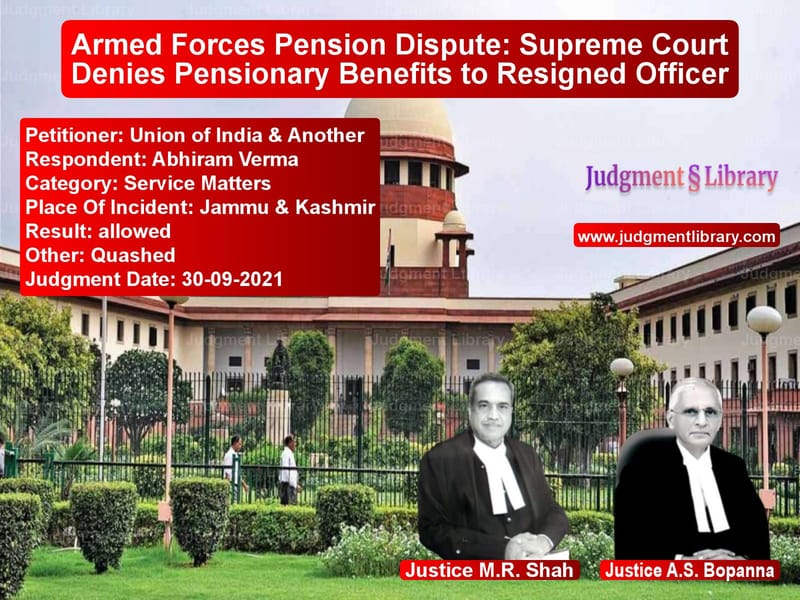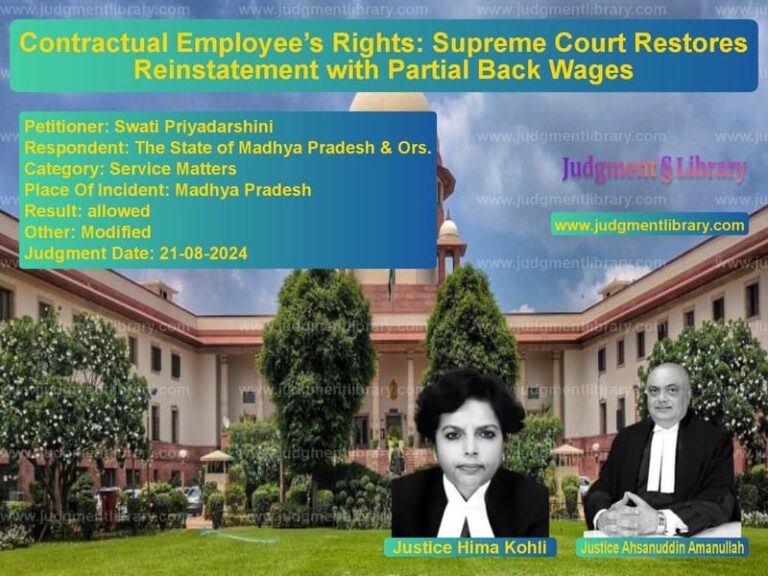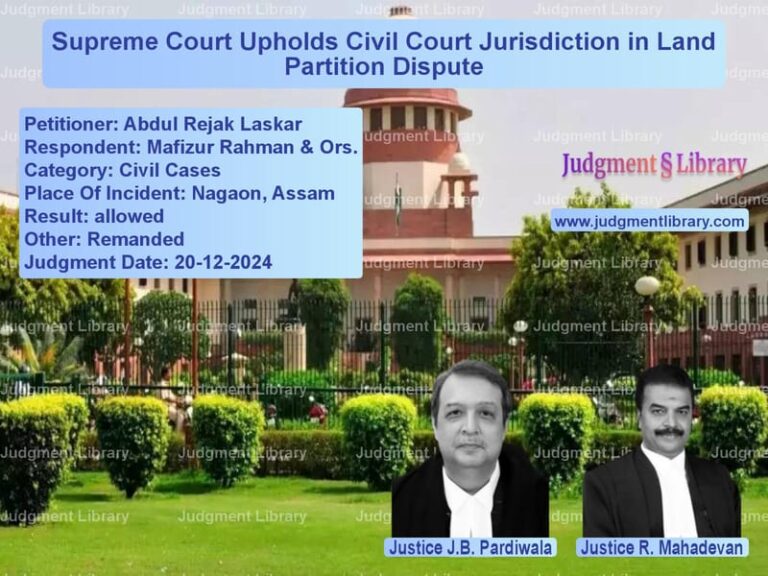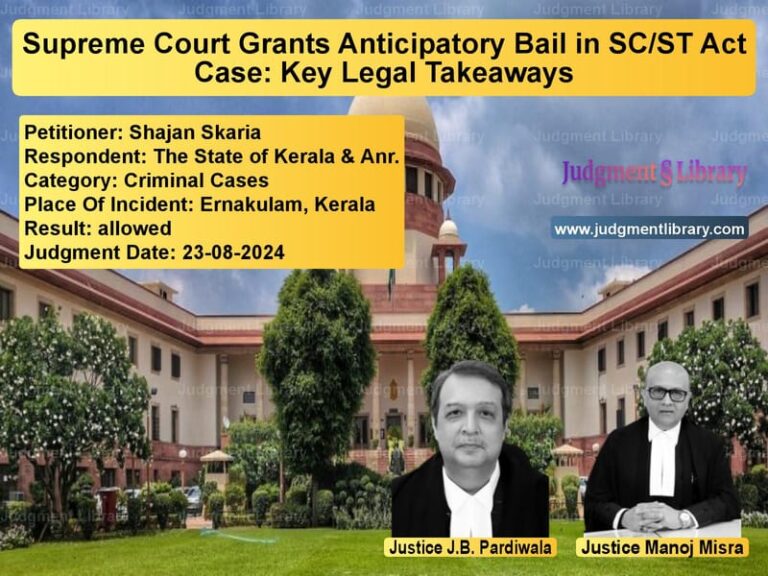Armed Forces Pension Dispute: Supreme Court Denies Pensionary Benefits to Resigned Officer
The Supreme Court of India recently ruled in the case of Union of India & Another vs. Abhiram Verma, addressing a dispute over pensionary benefits for an officer of the Indian Army Medical Corps. The officer, who had resigned before completing the minimum qualifying service, sought pension benefits under the Pension Regulations. The Court, however, ruled against him, holding that his resignation did not qualify as voluntary retirement and that he was not entitled to pensionary benefits under Regulation 15 of the Pension Regulations.
Background of the Case
The respondent, Abhiram Verma, was commissioned into the Indian Army Medical Corps as a Short Service Commissioned Officer on March 27, 1992. He later applied for Permanent Commission and was granted the same on January 28, 1998. On April 15, 2000, he submitted an application for resignation, citing lack of promotional prospects.
His actual date of superannuation, had he continued in service, would have been May 31, 2014. However, his resignation was initially rejected by the Army authorities, prompting him to challenge the decision in the Jammu & Kashmir High Court. The High Court ruled in his favor and directed the Army to reconsider his resignation. Consequently, his resignation was accepted on January 31, 2007, but he was denied pensionary benefits.
Armed Forces Tribunal Ruling
The officer then filed a petition before the Armed Forces Tribunal, which ruled in his favor on February 9, 2018. The Tribunal held that he was entitled to pension benefits as a “late entrant” under Regulation 15 of the Pension Regulations and directed the Union of India to process his claim.
Challenging this order, the Union of India filed an appeal before the Supreme Court.
Arguments by the Petitioner (Union of India)
- The Union of India contended that the officer had resigned rather than opted for voluntary retirement, making him ineligible for pension.
- It was argued that under Regulation 25(a) of the Pension Regulations, the minimum qualifying service for pension eligibility was 20 years.
- The petitioner asserted that Regulation 15 applied only to those who retired at the prescribed age limit, which was not the case here.
- It was emphasized that the officer had voluntarily left service and had not been compulsorily retired.
Arguments by the Respondent (Abhiram Verma)
- The respondent argued that his resignation should be treated as voluntary retirement, making him eligible for pension.
- He claimed that as a “late entrant”, his qualifying service should be counted as 15 years rather than 20.
- He also argued that his pre-commissioned service should be considered for pension calculation.
- He cited Pension Regulations, 2008, which allowed for relaxation in qualifying service.
Supreme Court’s Key Observations
- The Court held that resignation and voluntary retirement are distinct and cannot be equated.
- The Court emphasized that Regulation 15 applied only to officers who retired upon reaching the prescribed age limit, not those who resigned voluntarily.
- The Court rejected the officer’s claim that his resignation was forced due to lack of promotional prospects.
- The Court ruled that pre-commissioned service could not be counted under the applicable pension regulations.
Final Verdict
- The Supreme Court allowed the appeal filed by the Union of India.
- The judgment of the Armed Forces Tribunal was quashed.
- The Court ruled that the officer was not entitled to pensionary benefits.
Implications of the Judgment
This ruling has significant implications for Armed Forces personnel regarding pension eligibility:
- Clear Distinction Between Resignation and Retirement: The Court clarified that resignation does not confer pensionary benefits.
- Applicability of Regulation 15: The ruling ensures that only officers retiring at the prescribed age can claim the benefits of “late entrant” provisions.
- Importance of Qualifying Service: The judgment reaffirms that a minimum qualifying service of 20 years is mandatory unless the officer is compulsorily retired.
- Relevance of Pre-Commissioned Service: The decision prevents pre-commissioned service from being counted toward pension eligibility.
Conclusion
The Supreme Court’s ruling in Union of India & Another vs. Abhiram Verma sets a crucial precedent regarding pension eligibility in the Indian Armed Forces. The judgment clarifies that resignation does not entitle an officer to pension and that Regulation 15 applies only to those who retire upon reaching the prescribed age. This decision ensures that the pension system remains fair and consistent while maintaining discipline and commitment within the Armed Forces.
Petitioner Name: Union of India & Another.Respondent Name: Abhiram Verma.Judgment By: Justice M.R. Shah, Justice A.S. Bopanna.Place Of Incident: Jammu & Kashmir.Judgment Date: 30-09-2021.
Don’t miss out on the full details! Download the complete judgment in PDF format below and gain valuable insights instantly!
Download Judgment: union-of-india-&-ano-vs-abhiram-verma-supreme-court-of-india-judgment-dated-30-09-2021.pdf
Directly Download Judgment: Directly download this Judgment
See all petitions in Pension and Gratuity
See all petitions in Employment Disputes
See all petitions in Judgment by Mukeshkumar Rasikbhai Shah
See all petitions in Judgment by A. S. Bopanna
See all petitions in allowed
See all petitions in Quashed
See all petitions in supreme court of India judgments September 2021
See all petitions in 2021 judgments
See all posts in Service Matters Category
See all allowed petitions in Service Matters Category
See all Dismissed petitions in Service Matters Category
See all partially allowed petitions in Service Matters Category







